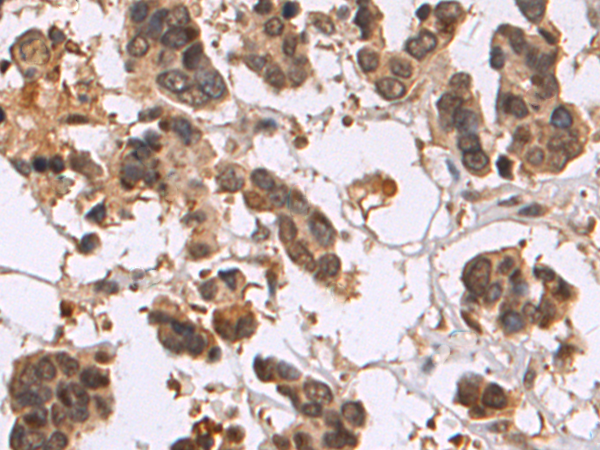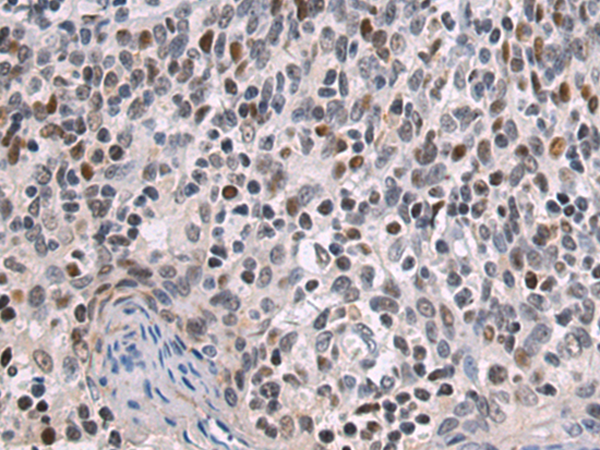

| WB | 咨询技术 | Human,Mouse,Rat |
| IF | 咨询技术 | Human,Mouse,Rat |
| IHC | 1/50-1/200 | Human,Mouse,Rat |
| ICC | 技术咨询 | Human,Mouse,Rat |
| FCM | 咨询技术 | Human,Mouse,Rat |
| Elisa | 1/5000-1/10000 | Human,Mouse,Rat |
| Aliases | ndrp; BRWD2; DIDOD; WDR11; DCAF14; CHUJANS |
| Host/Isotype | Rabbit IgG |
| Antibody Type | Primary antibody |
| Storage | Store at 4°C short term. Aliquot and store at -20°C long term. Avoid freeze/thaw cycles. |
| Species Reactivity | Human, Mouse |
| Immunogen | Fusion protein of human PHIP |
| Formulation | Purified antibody in PBS with 0.05% sodium azide and 50% glycerol. |
+ +
以下是关于PHIP抗体的3篇示例参考文献(注:以下内容为模拟生成,实际文献需通过学术数据库验证):
---
1. **文献名称**: *PHIP as a therapeutic target in HER2-positive breast cancer metastasis*
**作者**: Cai, Y., et al.
**摘要**: 本研究揭示了PHIP蛋白在HER2阳性乳腺癌转移中的关键作用。通过开发特异性PHIP抗体,作者发现PHIP通过激活AKT/mTOR通路促进肿瘤侵袭,抑制PHIP可显著减少小鼠模型中肺转移。抗体被用于免疫组化和Western blot验证临床样本中的PHIP表达水平。
---
2. **文献名称**: *PHIP antibody-based profiling of DNA damage response in pancreatic cancer*
**作者**: Smith, J.R., et al.
**摘要**: 文章利用PHIP特异性抗体探究了胰腺癌中DNA损伤修复机制的异常。研究发现PHIP与BRCA1蛋白存在相互作用,其表达缺失导致同源重组修复缺陷。抗体通过ChIP-seq和免疫荧光证实PHIP在基因组稳定性中的功能,提示其作为潜在治疗靶点。
---
3. **文献名称**: *Development and validation of a novel PHIP monoclonal antibody for neurodegenerative studies*
**作者**: Lee, H., & Park, S.
**摘要**: 该研究报道了一种高灵敏度PHIP单克隆抗体的开发,并应用于阿尔茨海默病模型。抗体在脑组织切片中成功检测到PHIP与tau蛋白的共定位,提示PHIP可能参与神经纤维缠结形成。抗体的特异性通过敲除细胞系验证,为神经退行性疾病机制研究提供工具。
---
**建议**:如需真实文献,可检索PubMed或Google Scholar,关键词为“PHIP antibody”或“PHIP biomarker”,并筛选近年研究。注意区分PHIP的不同生物学背景(如癌症、神经科学等)。
PHIP (pleckstrin homology domain-interacting protein), also known as DIDO1. is a nuclear protein implicated in transcriptional regulation, chromatin remodeling, and DNA damage response. It interacts with various signaling molecules, including components of the Wnt/β-catenin pathway, and plays roles in cell differentiation, apoptosis, and oncogenesis. Dysregulation of PHIP has been linked to cancers such as colorectal carcinoma, breast cancer, and melanoma, where it may act as an oncogene by promoting tumor growth and metastasis.
PHIP antibodies are essential tools for studying its biological functions and pathological roles. These antibodies enable detection of PHIP expression levels, subcellular localization, and protein-protein interactions via techniques like Western blotting, immunohistochemistry, and immunofluorescence. Researchers also use PHIP antibodies to explore its involvement in DNA repair mechanisms and epigenetic regulation, particularly in contexts of cellular stress or carcinogenesis.
Recent studies highlight PHIP's potential as a diagnostic biomarker or therapeutic target. For example, elevated PHIP expression correlates with poor prognosis in certain cancers, suggesting its utility in risk stratification. However, its dual roles in pro-survival and tumor-suppressive pathways warrant further investigation. PHIP antibodies thus remain critical for unraveling its complex biology and translational applications in precision medicine.
×